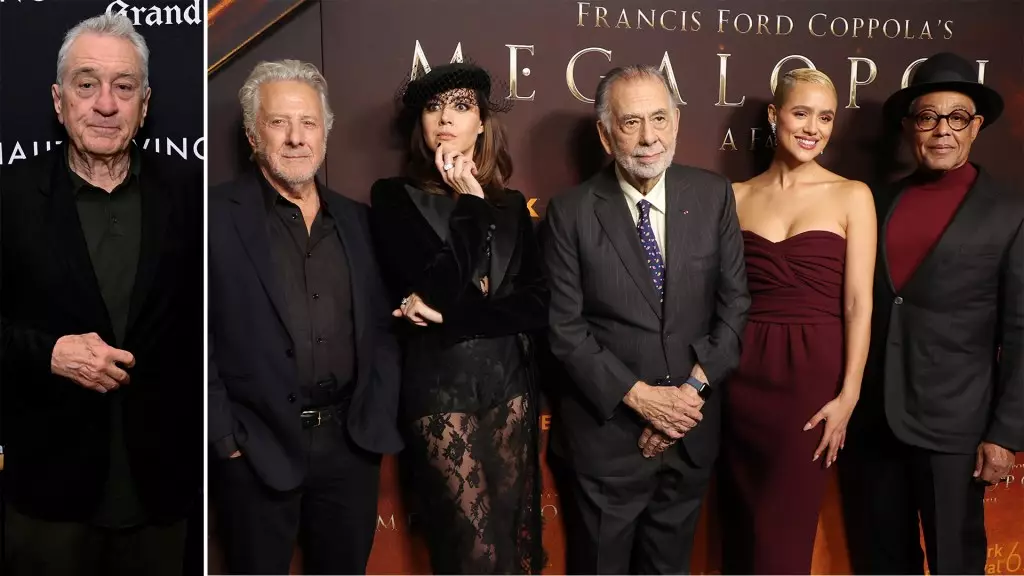At the recent New York premiere of Francis Ford Coppola’s latest venture, *Megalopolis*, actor Robert De Niro invoked laughter from the audience by presenting a provocative hypothetical. “Imagine Donald Trump directing this film,” he quipped, his demeanor starkly contrasting his words. While the audience erupted in laughter, De Niro maintained a serious façade, compelling attendees to reflect on the implications of such a thought. His assertions on Trump’s inability to lead anything of substance resonate deeply, particularly in a time when leadership qualities are gravely scrutinized in both the political and artistic spheres.
De Niro did not stop at mere jest; he also intertwined his critique with a pointed commentary on America’s current sociopolitical landscape. His declarations that “he cannot hold anything together” and a sentiment that Trump wants to “destroy the country” signal not merely personal grievances but a wider anxiety shared by many concerning the state of American democracy. Such statements are emblematic of the actor’s longstanding engagement with political discourse, particularly his vocal criticism of the former president, offering a glimpse into the ways cinema can serve as a platform for social commentary.
The backdrop of this significant premiere fell under the auspices of the New York Film Festival, where De Niro, Coppola, and fellow filmmaker Spike Lee partook in an engaging Q&A session. The event went beyond mere promotion as it was broadcasted live to 65 locations across North America, reflecting a collective anticipation for *Megalopolis*. The presence of celebrated actors such as Aubrey Plaza, Dustin Hoffman, and Giancarlo Esposito on the red carpet further signified the film’s allure, drawing film enthusiasts and critics who are eager to dissect its narrative and themes.
This Q&A served not only as a promotional event but revealed the intimate connections between these legendary filmmakers, allowing them to reminisce about their journeys in the realm of cinema. Their discussions referenced past works, such as *The Godfather* and *Apocalypse Now*, creating a rich tapestry connecting their historical and current contributions to film. The communal reminiscence accentuated the collaborative spirit that defined the 1970s film scene, fostering a sense of unity in a rapidly evolving industry.
As the discussion transitioned towards the film’s thematic concerns, De Niro addressed the urgent need for political activism, stating, “we have to go at this wholeheartedly to beat the Republicans.” His words signify a call to action, imploring attendees and viewers alike to engage in the democratic process, a stance echoed by Lee who emphasized the importance of voter participation. The conversation about the parallels between *Megalopolis*—which reflects on the decline of civilizations—and today’s political climate underscores how artists are not immune to societal dynamics; they are actively participating in these dialogues to provoke thought and inspire change.
Lee’s assertion that “forward not backward” is particularly resonant, as it underscores a necessity for progress in the face of regression. This sentiment parallels the narrative of *Megalopolis*, suggesting that the film itself not only serves as entertainment but also as a reflection of real-world anxieties and dilemmas.
Francis Ford Coppola’s own reflections on the film’s troubled passage to the screen loom large over the event. Having poured a staggering $120 million of his personal fortune into the project, Coppola’s investment is both a bold artistic gamble and a testament to his unwavering belief in storytelling. His remarks during the Q&A hinted at a desire for harmony on film sets, echoing the film’s exploration of human relationships amidst chaos. The casting decisions—inclusive of actors with opposing political views—demonstrate his philosophy of coexistence, a stark contrast to the polarized climate often portrayed in contemporary narratives.
Furthermore, the film’s journey from conceptual vagueness to its Cannes premiere illuminates the labyrinthine process that accompanies ambitious artistic endeavors. While reviews from the prestigious festival have been mixed, the ambition behind *Megalopolis* fascinates critics and audiences alike. This duality of risk and reward is something Coppola, Lee, and De Niro embody in their creative endeavors, showcasing the complexity of storytelling in a divided society.
Ultimately, the discussions at the *Megalopolis* premiere encapsulate a broader commentary on the state of cinema amid rising sociopolitical tensions. De Niro’s impassioned response, alongside Lee and Coppola’s reflections, presents film as a means not only of entertainment but of cultural critique and political engagement. As filmmakers grapple with their roles in a fractured world, they remind us that storytelling, at its core, remains a powerful vehicle for reflection, urging audiences to confront uncomfortable truths and engage with the realities of their times. In light of this, *Megalopolis* stands as a promising artistic commentary, inviting viewers to ponder the intersection of art, politics, and human experience.


Leave a Reply